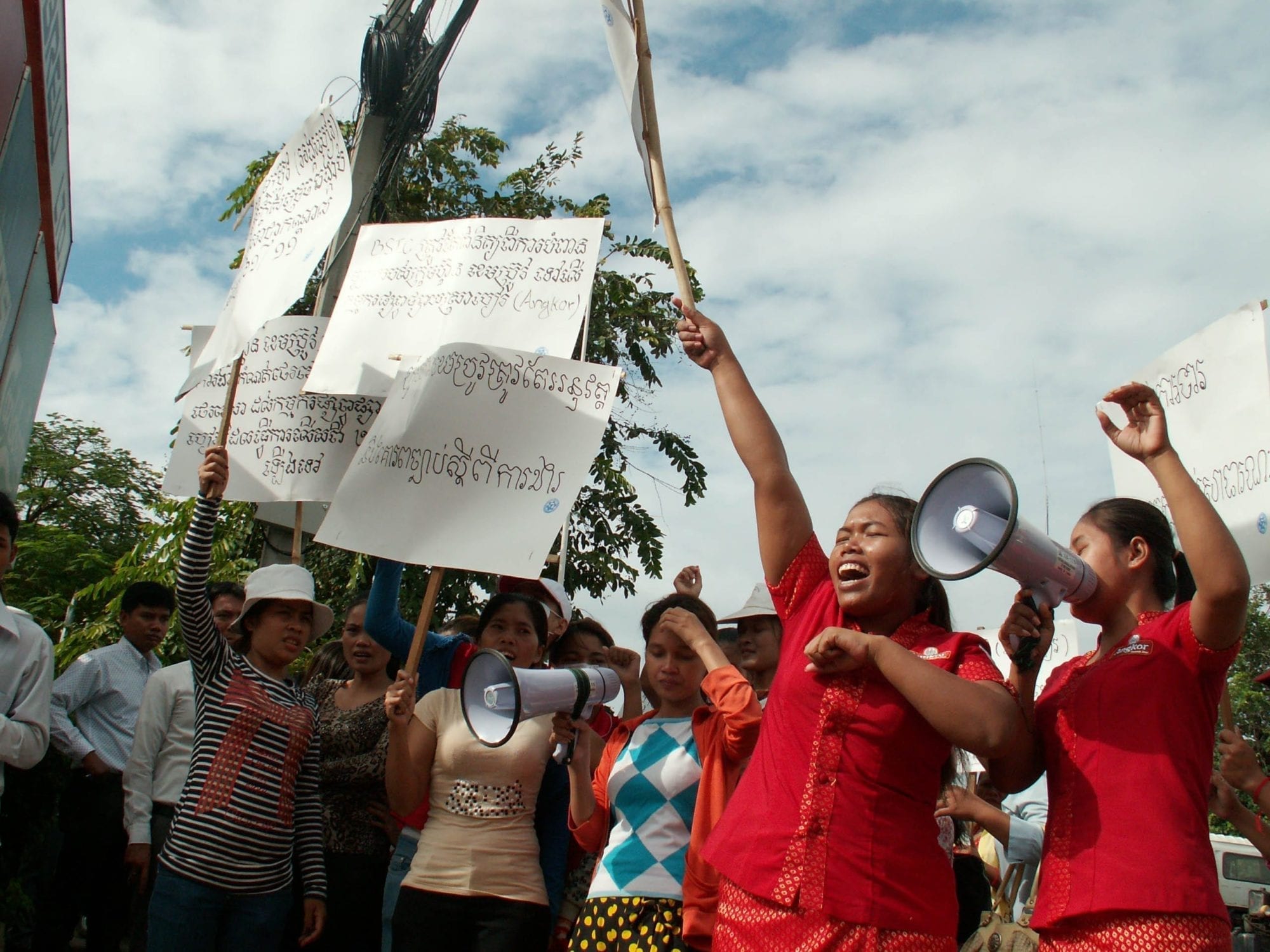
Sep 8, 2016
Women, people of color, indigenous and other disenfranchised and marginalized groups have been hit especially hard by the increasing concentration of transnational corporate power and escalating global economic inequality—but a new report showcases how women and oppressed people are shifting the dynamic through their own power of resistance.
Key to the success of such movements, according to the report, “Challenging Corporate Power: Struggles for Women’s Rights, Economic and Gender Justice,” is “a deliberate effort to unite experiences and struggles across different movements.”
“Each struggle … uses cross movement collaboration in some way to defy corporate power,” according to the report.
“Challenging Corporate Power” stems from an early 2016 cross-movement dialogue convened by the Association of Women’s Rights in Development (AWID) and the Solidarity Center. Facilitated by Just Associates (JASS) in São Paulo, Brazil, the meeting brought together women trade unionists, women workers, feminists, indigenous and black women, lesbian, bisexual, trans, queer, Intersex (LBTQI) activists, av nd women human rights defenders to discuss, debate and share understanding of corporate power, and what it means to their struggles and their lives.
The report will be released September 10 at AWID’s 13th International Forum in Bahia, Brazil, where more than 1,800 participants are gathered this week to strategize around “Feminist Futures: Building Collective Power for Rights and Justice,” the report’s key finding. Cross-movement initiative sessions throughout the conference include the Solidarity Center-sponsored “Building Alliances to End Gender-Based Violence in the World of Work,” a three-hour discussion how gender-based violence at work links to larger struggles for economic and gender justice. The Solidarity Center also is holding a panel on “Women’s Economic Empowerment and Worker Rights,” moderated by Solidarity Center Executive Director Shawna Bader-Blau.
Women Workers Form Unions to Reverse Tide of Inequality
At the January meeting, participants discussed five successful movements to demand accountability—for labor rights violations, ecological damage, trade liberalization and privatization. Women beer promoters in Cambodia, for example, are increasingly forming unions with the Cambodian Food Service Workers Federation (CFSWF) to protest against poverty wages, sexual harassment and violence, long working hours and toxic working conditions in bars and restaurants.
They are some of the 70 million women organized in trade unions today, with many millions more in cooperatives and other worker rights associations, according to the report. Increasingly, there “is a call to scale up struggles of resistance, build bridges between different social movements, and foster and grow people’s power to build new forms of production, consumption and distribution of the world’s social and economic resources,” the report finds.
Through a lens of power analysis developed by JASS, the report examines how corporate power—defined as an excessive control and appropriation of natural resources, labor, information and finance by an alliance of powerful corporations and global elites in collusion with government—affects gender justice, women’s rights and lives through its influence on police that shape the global economy.
The power analysis lens illustrates how corporate power operates and its impacts on women and oppressed peoples. For instance, 63 percent of the top 175 global economic entities are transnational corporations, not countries, a concentration of power that affects gender justice, women’s rights and lives through its influence on policies that shape the global economy.
At the same time, some 70 percent of workers are in vulnerable employment. Women from racially and ethnically marginalized groups and migrant women worldwide, including those living in the global North, have less access to education and skills training, are responsible for an unequal share of unpaid work and domestic homes and are more likely to be in low paid and informal employment without social security benefits.
The recommendations and reflections emerging in the last moments of the Cross Movement Dialogue speak to how women trade unionists, LBTQI activists, feminists, indigenous women and women human rights defenders can sustain their victories by consolidating the power within their movements, nurturing collective power with other social movements, and exerting power over corporations and governments acting in their interest.
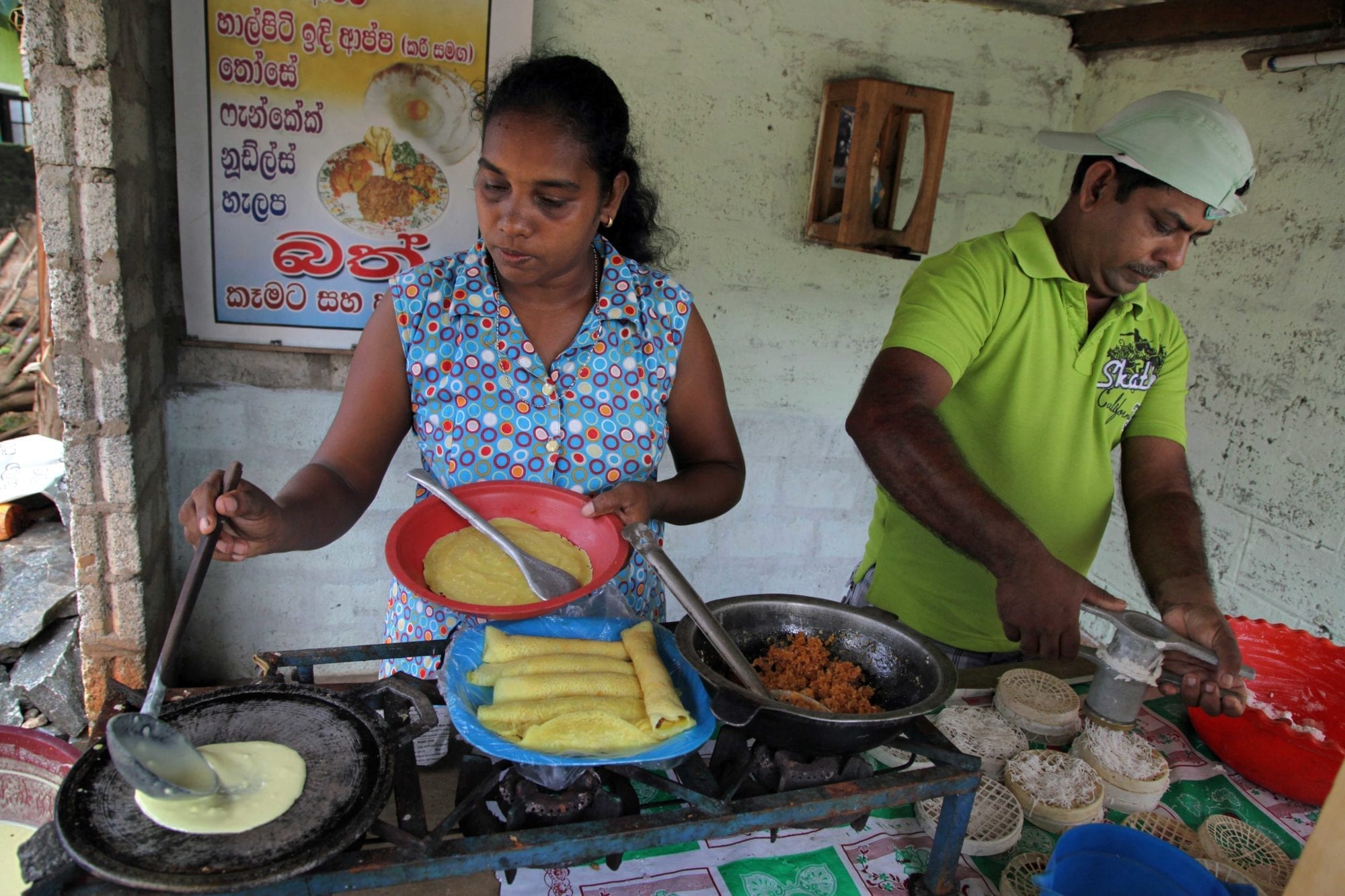
Sep 7, 2016
The 2009 end of Sri Lanka’s civil war was an opportunity for workers to return to the security and protections of the formal economy, which had been destabilized by 26 years of violence. However, a new Solidarity Center survey finds that peace has yet to bring the hoped-for economic gains to workers in Jaffna, the capital of Sri Lanka’s Northern Province. The survey’s findings on working conditions are especially important because the exploitation of workers is not only a setback for healthy industrial relations in Sri Lanka’s economy, but has the potential to aggravate social tensions and interfere with the ongoing process of peacebuilding.
“The bulk of the workers in Jaffna are in low-paid jobs with minimal labor standards, social protection and security of tenure, which are not conducive to creating sustainable livelihoods,” according to the summary.
“A key element to address conflict is equal treatment under the law,” says Tim Ryan, Asia regional program director at the Solidarity Center, who presented the survey’s findings during a recent discussion of the report at the National Endowment for Democracy (NED) in Washington, D.C.
According to Ryan, the survey seeks to provide economic data on workers in Northern and Eastern Sri Lanka that go beyond employment statistics. “Are they finding ways to both protect their rights under the law? Are laws and standards being equitably enforced?”
Workers Rights Laws Not Enforced
Despite worker-friendly Sri Lankan legislation like the Employees’ Provident Fund (EPF), an employer-funded government social security that has existed for decades, the Solidarity Center’s survey shows a majority of workers—76 percent—do not have the labor rights they are legally guaranteed due to a lack of enforcement. Of that percentage, only 22 percent of female respondents and 46 percent of male respondents say they receive what they are owed by the EPF.
The gendered difference in access to social protections is only one example of a trend persistent throughout the survey’s results, which suggests that female workers are disproportionately disadvantaged under the current conditions. A large wage gap exists between male and female respondents, including between employees doing identical work. The rate of female unemployment is nearly double that of male unemployment. And more than 80 percent of female respondents say they are unaware of their right to overtime benefits, compared with 49 percent of male respondents.
More such initiatives are needed. Although Sri Lanka is a member of the International Labor Organization (ILO), the survey confirms that more progress is needed to move the country toward the goals outlined in the ILO’s agenda for decent work. While ongoing tension and inequalities in Sri Lankan politics complicate the protection of worker rights through legislation, workers’ organizations like trade unions can help hold employers accountable to their employees and bring Sri Lanka in line with the standards of the international community.
“Workers in Post-Civil War Jaffna: A Snapshot of Working Conditions, Opportunities and Inequalities in Northern Sri Lanka” was made possible through a NED grant.
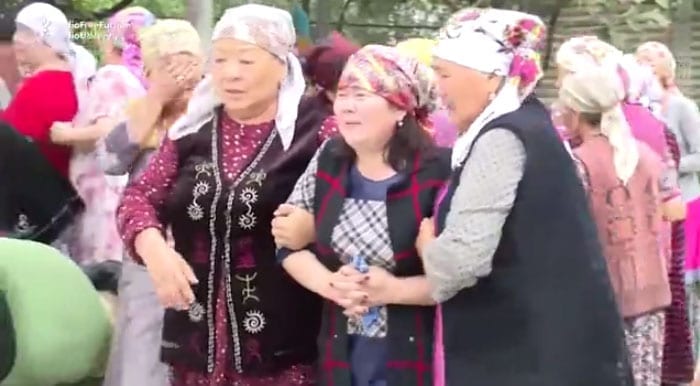
Sep 1, 2016
The search for a better future and the means to support their families in Kyrgyzstan ended tragically for 14 migrant workers Saturday, August 27, in Moscow, when their printing plant caught fire. All of the victims were young women, including two 17-year-old girls, according to reports. Three Russian workers also died.

One of two young Kyrgyz women killed in a Moscow factory fire. Credit: Radio Free Europe/Radio Liberty
Burials for the workers were held August 31, in towns around Kyrgyzstan.
The mother of a 21-year-old lost in the fire told Radio Free Europe, “With no work here, the Kyrgyz have to leave.”
The majority of Kyrgyz who leave their country to find work—estimated at about 500,000—head for Russia. There they often face discrimination, exploitation and unsafe working conditions. In the last five years, an estimated 1,500 Kyrgyz migrants to Russia died in workplace and other incidents.
“The stories of the victims are the same: unemployment, poverty, migration,” says Lola Abdukadyrova, Solidarity Center program coordinator in Kyrgyzstan. “They hoped to gain enough money to help to their families.”
Over the last year, more than 1,000 people went through the pre-departure trainings for the migrants conducted by the Solidarity Center in all regions of Kyrgyzstan. They were briefed about their rights and responsibilities while staying in the Russian Federation, with special attention to the legal aspects of employment. Workers were urged to finalize individual employment contracts, in particular, during the trainings. In addition, the Garment, Metallurgy and Mining, Transport and Retail Workers’ Unions actively supported an informational campaign to support migrant workers, putting up posters and installing informational boards in the biggest markets, bus stations and airports across the republic.
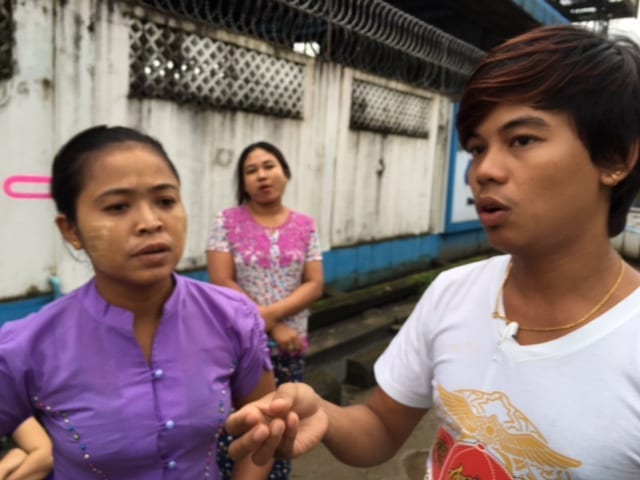
Aug 26, 2016
Fifteen minutes before the gray, 12-foot gate of the garment factory compound in Myanmar’s Hlaing Thar Yar industrial zone opens to release workers, vendors selling fried chicken on sticks and bags of nuts gather in anticipation. At a designated time, the guards roll back the gate and the vendors push their heavy carts up a steep hill and into the compound. If they hesitate, they are locked out as guards quickly close the gate behind them.
Minutes later, the gate is opened again, and workers rush down the hill to the dirt road, jostling for a place on the open transport trucks that will take them over rutted roads to packed apartments where they pay nearly a quarter of their wages to live. There, they can again access their mobile phones, which are prohibited from factory premises, where the heavy gate locks them behind steep walls from the start to the end of their daily shifts, six days a week.

Lwin Lwin Mar migrated from Myanmar’s Irrawaddy Delta in search of a job, and now is among 300,000 garment workers in Hlaing Thar Yar industrial zone. Credit: Solidarity Center/Tula Connell
The scene is repeated countless times across the vast industrial zone, where more than 700,000 workers toil, including 300,000 garment workers. Corporate brands from around the world source their clothes, shoes and other apparel to factories in Hlaing Thar Yar.
Most of the workers, like Lwin Lwin Mar, 34, migrated to Hlaing Thar Yar, 12 miles northwest of Yangon, from other areas in Myanmar. Lwin Lwin Mar came from Irrawaddy Delta in search of a job after the 2008 cyclone devastated the region. Aung Myint Myat, a co-worker of Lwin Lwin Mar from the Bago region, sends money back home to his relatives, as do many factory workers.
Both garment workers helped form a union at a 200-worker factory, standing up to massive employer resistance. Many workers were fired in 2015 for forming the union, but with the assistance of the Confederation of Trade Unions–Myanmar (CTUM), some workers returned to the job.
“The life of workers is very poor,” says Myo Zaw Oo, a CTUM organizer who helps garment workers form unions and helps solve their problems at the workplace. “Workers don’t know about their rights. They are very vulnerable,” he says, speaking through a translator.
Unions Seek to Ensure Labor Helps Shape the New Economy
Last year, Myanmar passed its first-ever law setting a minimum wage—$83 per month—yet employers do not always pay it. Nor do they follow the country’s minimal safety and health regulations or overtime laws, union activists say, making worker education a top priority for CTUM. Even the full minimum wage is not sufficient for workers to support themselves and their families, union leaders say.
After five decades of military dictatorship, political transformation has opened the country in the past few years, and union leaders have sought to ensure that workers are part of the process structuring the ensuing economic and cultural change.
Shortly after he returned to Myanmar in 2012 after nearly 30 years in exile, CTUM President U Maung Maung met with corporate leaders of international brands at a Washington, D.C., conference sponsored by the Solidarity Center and AFL-CIO. The meeting was part of a labor-backed process to ensure corporate accountability and respect for worker rights are embedded at the start of the foreign investment process in Myanmar.
“Labor needs to be involved from the start,” Maung Maung said at the conference. “I would rather have workers’ rights built in from the beginning rather than added on later.”
Helping Workers Form Unions Across Myanmar
Today, CTUM is spearheading union building at a rapid pace, with more than 60,000 workers forming unions since 2012, when Myanmar passed laws allowing the creation of unions. Factory-level union activists like Two Ko Ko, 32, are identified for leadership potential in CTUM, and invited to take part in training to build their skills.
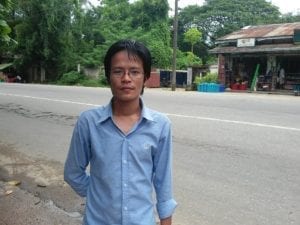
Two Ko Ko, an organizer with the Building, Woodworkers Federation–Myanmar, a CTUM affiliate, helps workers form unions at cement and plywood factories in Hmawbi, an hour north of Yangon. Credit: Solidarity Center/Tula Connell
Now an organizer with the Building, Woodworkers Federation–Myanmar, a CTUM affiliate, Two Ko Ko helps workers form unions at cement and plywood factories in Hmawbi, an hour north of Yangon, as well as at construction sites.
“Workers don’t understand that they have rights that are on the books,” he says. “Law enforcement is weak. Unions help make employers follow the laws.”
For instance, says U Lim Mg, union president of a 170-worker clay factory where workers formed a union in 2012, “the union is enforcing the 1951 Factory Act that governs hours and safety.”
The workers ground and mold clay to make floor and roof tiles and are exposed to heavy dust. But until they formed a union, the employer provided only flimsy paper masks. Now, they have proper protective equipment, says Two Ko Ko.
“I have seen much progress since the union has been at the workplace,” says Tin Tin Than, 43, who has worked as cleaner for 10 years at the clay factory. She says their collective bargaining agreement ensures the employer pays the minimum wage and provides transport to and from the factory.
Despite the many challenges, including strong employer resistance to unions and a broad lack of familiarity with fundamental worker rights, Myanmar union activists like Two Ko Ko are determined to help workers achieve decent wages, safe and healthy workplaces and respect at work.
“The best part of my job,” he says, “is when people recognize their rights and decide to form unions.”
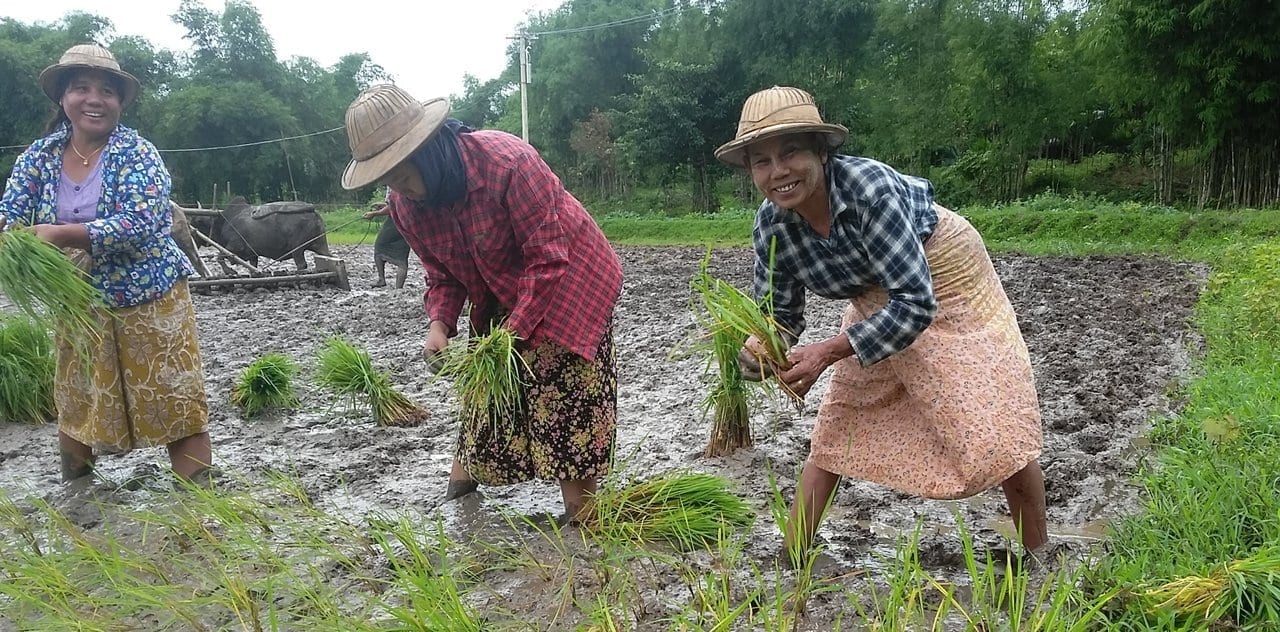
Aug 17, 2016
On a hot, damp morning in Hlae Ku Township, Myanmar, Kyin San surveys the rice fields spread below her, as Mg Zaw, knee deep in mud, drives two oxen to plow the remaining plot. For many years, Kyin San, like most of the farmers in the area, worried that her land would be confiscated for large-scale development, as had so many other farms over the years.
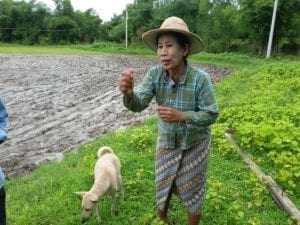
Burmese rice farmer Kyin San says by joining a union, farmers can share strategies and techniques to improve their craft. Credit: Solidarity Center/Tula Connell
But now, Kyin Sun says, farmers are no longer hesitant to negotiate with the government to settle disputes. Along with 10,000 other farmers in the township, Kyin Sun has joined the Agriculture and Farmer Federation of Myanmar (AFFM), part of the Confederation of Trade Unions–Myanmar (CTUM).
“Through CTUM, we have made much progress,” she says, speaking through a translator.
Farmers across Myanmar are the fastest growing group of workers forming unions since 2011, when a new law allowed creation of unions. Within weeks of the law’s passage, farmers, woodworkers, garment workers, hatters, shoemakers and seafarers quickly registered their unions.
Connecting Farmers
Htay Lwin, president of the Hlae Ku Township agricultural union, says farmers also have sought to join unions to learn new technical skills to improve their farming techniques, a goal Kyin San says has been advanced by union membership.
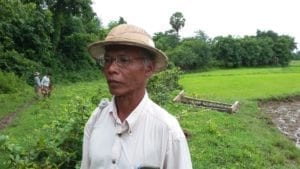
Union President Htay Lwin says many farmers are joining unions to protect their land from being confiscated for large-scale development. Credit: Solidarity Center/Tula Connell
“Now we can communicate with farmers across the country and share our experience with others,” she says.
AFFM members are connected with the Asian Farmers Association for Rural Development, a regionwide organization based in the Philippines that provides training on seed production, food safety and other issues, says CTUM President U Maung Maung.
Speaking from CTUM offices in downtown Yangon, Maung Maung discussed how the federation is moving forward with the plan he nurtured for decades during his political exile in Thailand.
“We are doing what we wanted to do for the past 30 years—building unions, getting into negotiations with employers, trying to develop policies with labor and management,” he says.
Rebuilding Worker Power after Decades of Dictatorship
Maung Maung was forced into exile after a violent military crackdown targeted thousands of pro-democracy demonstrators and labor leaders, many of whom were sent to prison. He returned to Burma in 2012 and since then, CTUM has helped some 60,000 workers organize unions. CTUM received official government registration last year.
Now, CTUM is working with policymakers to enact social welfare reforms and drafting recommendations for revising the country’s labor laws, many of which were enacted when the country achieved independence from Britain in 1948. After decades of military rule, Myanmar trails many Asian nations economically, and Maung Maung sees much work ahead in modernizing the workforce and developing a culture of social dialogue among workers, business and government common in other countries.
Fundamental to effecting the change CTUM envisions is educating workers about their rights. Workers for many years had no freedom to improve their working conditions, and unions now are helping them understand that they can stand up for their rights—and how to do so.
Because, as Maung Maung says, it all comes down to the workers.
“The workers have to know what they want—and they have to push for it.”










